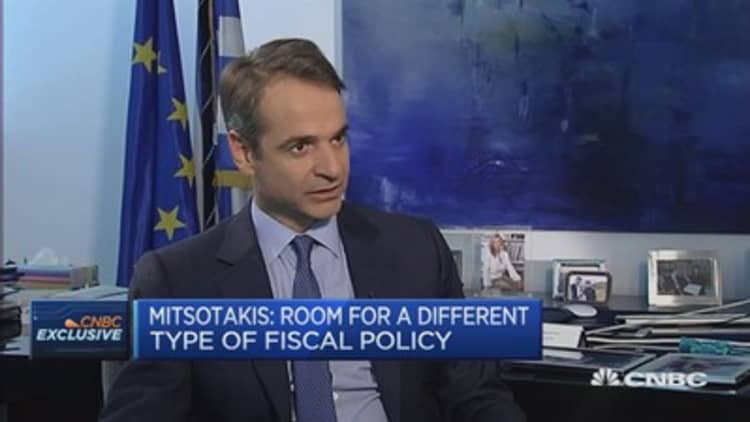The government of Greek Prime Minister Alexis Tsipras will face a confidence vote Wednesday after a coalition partner quit over a naming deal with neighboring Macedonia.
The vote raises questions about the future of Tsipras' leadership and whether a snap election in the highest indebted euro zone economy could be just around the corner.
Why is the confidence vote taking place?
Greece has been under the leadership of Syriza and Anel (The Independent Greeks) parties for the last four years. The country is due to have a new general election this year, by the end of October.
However, the junior coalition party decided to leave the pact at the weekend due to differences over a deal with Macedonia.
Greece and Macedonia have been at odds since 1991 regarding the latter's name. Athens has been of the opinion that it could imply territorial claims over a province in Greece with the same name. The topic is highly sensitive in the country.
Tsipras agreed a deal last year with the government of Macedonia, whereby the country's name would change to the Republic of North Macedonia. As a result, Greece would lift its objections to its neighbor joining organizations like NATO and the EU. Macedonia's Parliament approved a constitutional amendment to change the country's name at the weekend, but it still needs to be approved in the Greek Parliament.
The Greek nationalist party Anel is against this deal.
What are the chances that Tsipras will lose the vote?
"According to (the Greek) press, the government has secured the votes necessary to pass the confidence vote," investment bank Axia Ventures said in a research note on Monday.
Tsipras needs at least 151 votes to win with an absolute majority.
Back in June, the opposition New Democracy party also put forward a vote of no confidence against the government on the back of the deal with Macedonia.
What are the chances of an early election?
There is split opinion on whether Tsipras will manage to lead Greece into the next scheduled General Election.
"I'd say there is a rather large probability Tsipras will call snap elections in the coming months," Maartje Wijffelaars, economist at Rabobank, told CNBC via email.
"Based on early statements of several (by now former) ANEL ministers/MPs, the government might well survive Wednesday's confidence vote. But by becoming a minority, and likely, lame duck government, it might become more worthwhile for Tsipras to call early elections than to wait until October," she added.

However, Constantine Fraser, European analyst at research firm TS Lombard, said that Greece will probably avoid a snap election in the coming months, given that some lawmakers of Anel will continue to support the government.
"Greece's creditors and the EU will be looking closely not only at the vote of confidence, but at the numbers in parliament on the government's other business," Fraser said.
"But a snap election could be positive for markets: It would be better than a toothless minority government and could bring the business-friendly opposition to power," he also noted.
A poll out on December 18, by the poling company Pulse RC, showed that if the General Election were to take place now, the conservative party New Democracy would win with 38 percent of the votes. Tsipras' left-leaning Syriza would place second with 26 percent.
"If Tsipras indeed survives Wednesday's confidence vote, I do expect him to first try to pass policy covering these benefits and tax changes before calling new elections. If he then fails to implement such measures he could blame the opposition, while if he doesn't try the opposition could use it against Syriza in the campaign," Wijffelaars also said via email.
Greece exited its third bailout program last August, after nearly 10 years of external financial help. Life after the bailout program will be a heated topic ahead of the election, as most voters would not have yet felt a huge positive change in their pockets.
Paul Donovan, chief economist at UBS Global Wealth Management, said Monday in an email: "Itself, a Greek election is of limited interest to international investors. Greece is more firmly established as a member of the euro and is running a primary fiscal surplus. However, investors may choose to look at the extent of support for unconventional or extreme political groups and extrapolate that into European trends."


